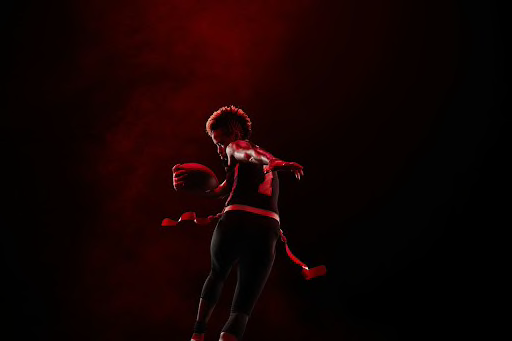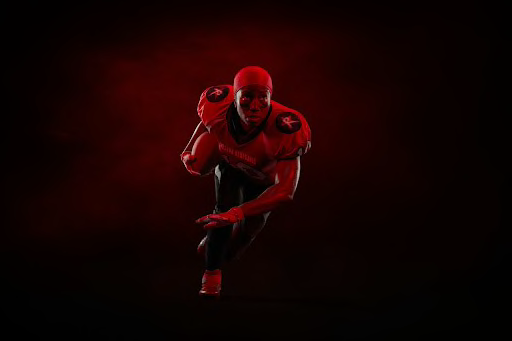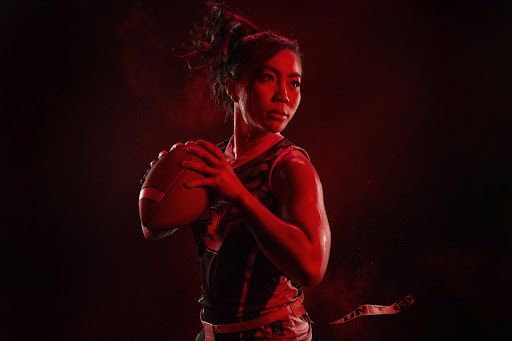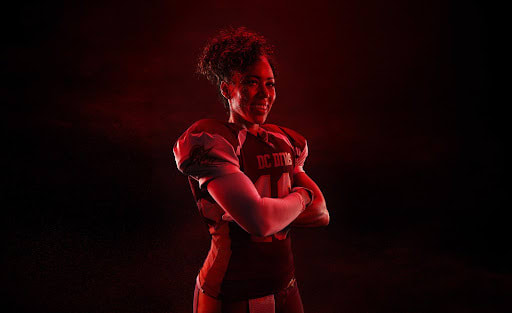On National Girls and Women in Sports Day, four women in football on Team Milk are fighting for the quintessential “man’s game” to be available for all.
The mustachioed “Got Milk?” campaign was a cultural cornerstone in the 1990s and 2000s. Actors, models, musicians and athletes graced the unforgettable posters, all sporting sheepish grins adorned by milk froth. Tom Brady, Brett Favre, and Patrick Ewing were a few of the athletes represented over the years. So were Serena and Venus Williams, as well as Nikkie McCray, Lisa Leslie and Sheryl Swoopes.
The foundation these women set goes beyond being poster girls for their sports. The greatest tennis player of all time paved the way for Naomi Osaka, and Her Airness paved the way for Candace Parker and all WNBA athletes. In 2022, four women were chosen by Team Milk to pioneer a new slogan for the next generation: Football Is Football.
For the uninitiated, women play professional American football, too. There is a professional tackle league, the Women’s Football Alliance (WFA), that signed a landmark broadcasting deal with ESPN 2 in an effort to expand the fandom of the league. There is also a professional flag football team governed by USA Football, which is participating at the World Games in July 2022. Flag football could become an Olympic sport in Los Angeles in 2028 — a global sport that includes women from all over the world.
For too long, football has maintained a cultural fixation as a display of the ideal American masculinity. This is by intention and design: because women have been playing football for decades, and they have been systemically banned from forming leagues and playing the sport they love. In 1939, Life Magazine devoted their cover story to a women’s league in 1939. The nationwide response was swift and uniform: women who play football would set a dangerous precedent. “It is quite obvious that football (regardless of rules) is wholly unsuited to the physiological and anatomical limitations of girls,” declared the superintendent of the Los Angeles parks and recreation department. Their permits to play at local parks were revoked, and women’s football was repeatedly stymied in the resulting decades.
Joann Overstreet, Adrienne Smith, Jona Xiao and Lois Cook will be the first to say that there is a long legacy of women who came before them who made what they do today possible. But these four women on Team Milk represent the endurance, strong will, perseverance and mental toughness that is needed to play football. They don’t play a kid’s game for a king’s ransom the way NFL players do, because most of them were told to stop playing once they reached high school. For now, women’s football is a sport played by women who were all told no — but on Girls and Women in Sports Day, they echo a resounding yes to all the girls who want to grow up and become footballers.

Joann Overstreet
Today, Joann “Jo” Overstreet plays wide receiver for the U.S. Women’s Flag National Team. But back in Texas in the 1990s, Overstreet played quarterback, receiver and safety as the only girl on her youth league football team.
Overstreet was recognized for her talents, but she still remained separated from her teammates in profound ways.
“What I thought was super cool as a kid, and now as an adult, I see that what they did was they protected me,” Overstreet said.
“Everyone, back then, I was the only girl, so they wanted to come after me. ‘Oh, she’s soft, we’re gonna beat her up. We’re gonna hit her. We’re gonna contact her. We’ll just get to the quarterback. Let’s beat her up.’ So what I was seeing, the response was, my teammates would come out and have my back. They were just knocking people over as I’m running with the ball, I’m like, ‘Move! Move! Move!. And just pushing them out the way, and I was like, ‘Man, I love that.’ I love that team camaraderie that we had. When I was young, they had my back through the whole entire season. I mean, we won city champions.”
“I did feel alone because I was in my own locker room,” Overstreet admitted. “I was not allowed to be in the boys locker room until you know they were all completely dressed and they were like, ‘Okay, Jo, you come in.’ In moments like that, I did feel alone. I did feel like, ‘Why are there no girls playing this sport?’, and it was for a long time. I didn’t realize until I was an adult that there are opportunities for girls to play football. But having that opportunity to play young has made me the athlete and the person that I am today.”

Adrienne Smith
Like Jo, Adrienne Smith was encouraged to play at a young age, but her opportunities stopped at high school when she was unable to progress as a football player.
Eventually, Adrienne was able to live out the dream she’s had since age 3 as a wide receiver for the Boston Renegades. Although they were only formed in 2015, the Renegades already have three WFA championship titles.
Not only has the city of Boston been supportive of their WFA team, but Boston sports fans themselves take pride in another dynastic New England franchise.
“It’s outstanding,” Smith says of the glowing support from Bostonians. “It was some time last season, before Mr. Kraft even blessed us with the flight on the Patriots jet, I just happened to be going to a store before practice. And I’m in the store I had on a Renegades practice jersey, and then all of a sudden, people recognize me, and there was this, ‘Do you play for the Renegades?’ And I had to do a double-take. ‘Why yes, I do!’ I didn’t even realize that we had, I guess we’re becoming, more of a household name. It’s just a phenomenal feeling. I live in New York City, but I play for Boston, but all of my Boston teammates who live there, they say there’s something in the water. Boston constantly wins, and you could just make up a sport, like, flicking pencils into a cup. People in Boston would be the best at it.”
What makes the Renegades’ recent success even sweeter is the fact that the New England Patriots are some of their biggest supporters.
“Oh, it’s absolutely important,” Smith said of having NFL allies advancing women’s football. “We definitely have Mr. Kraft and just the whole Kraft organization supporting us, and then Devin McCourty even gave us a shout-out when he started wearing his Boston Renegades t-shirt.”
“It does two things: one, it’s just really cool, but then two, it sends a signal to boys and girls that there is equity and that there’s a place for men and women in football. I think that’s the power that representation has. When you have some of these NFL players giving a shout-out, it means a lot. It helps shift the paradigm from being separation and inequality to one of unity.”
Although football has forever been portrayed as a tough sport unique to men, Smith laughs at the idea that there’s anything tougher than giving birth.
“I don’t know what gets tougher than a woman who’s had children, so let’s just rewrite everything when we’re talking about what true toughness is,” Smith said. “Honestly, for me, it’s no longer a male-dominated sport, right? We’ve got women playing, succeeding, in this sport. We’ve got girls who are growing up who are participating for the first time in this pipeline that’s going to produce some amazing talent. I’m just really excited about what the future holds. And Team Milk is the springboard that we’re using to get that message out there and to be seen and to have a phenomenal platform that’s going to encourage so many people.”

Jona Xiao
Growing up in St. Louis, Jona Xiao faced levels of adversity as one of the only Asians in her community. Because of her ethnicity, people used to tell her that she would “eat, sleep and breathe education.”
Like every great athlete, Jona took the chip on her shoulder and turned difficult experiences into a chance to prove people wrong. Jona became an actress, recently starring in Disney’s “Raya and the Last Dragon” and Starz’ “Hightown.” But in her off time, she plays flag football as the captain of her Los Angeles-based team, She Unit.
“I think every time I step on the football field, I put a little pressure on myself to perform because I feel like I’m representing women,” Xiao said. “If I would do poorly, then people could make that comment, although it’s not fair. Like, ‘Oh, see, women can’t play football. And so I think it’s a really big job of mine to be one example of what females are capable of on the field.”
In the past, Xiao has played in adult co-ed leagues with mixed experiences. One particular moment illustrates how those around her doubted her and defended her as a female quarterback.
“I remember one of the first times I was throwing at the beach, this male quarterback was on my team. The first game, things were going well, he didn’t really say much. The second game started becoming like a tight game, and I was about to call a play, and he just snatches the football out of my hands and he goes, ‘I’m throwing now.’ It was like, ‘Whoa.’ If he had asked nicely, I probably would have said yes, but that was so inappropriate. And I think I said, ‘You can leave,’ and he decided to stay and play receiver and I think we won anyway, so yeah, there’s definitely been some ups and downs. I’ve also played in a men’s league, and it was a really fun challenge. I had a couple of my female She Unit teammates with me on that team. I love that challenge and breaking stereotypes for both women and Asians. It’s a challenge that I welcome.”
When women have played football in the past, some balked at the notion that women could play such a conflict-rife sport. Xiao disagrees, noting that proper nutrition is key to lasting on the field.
“We have a lot of stereotypes to overcome. And I know a lot of people who still feel like, ‘Look, football, because it’s so tough on the body, should just be for men. It’s not for women’s bodies.’ But I obviously strongly disagree. I think there’s no sport that’s just for one gender. There’s nothing that a male can do in the sport that a female can’t. I think yes, football takes a toll on your body, which is why I think it’s really important to focus on your training and recovery. For me, milk is a big fuel for my performance beforehand and afterward, so I think it’s just taking care of yourself, so that for men and women, it is not as harsh on your body. It is a tough sport, but I think women are more than capable of handling it and dominating it.”

Lois Cook
Lois Cook holds a unique place in the WFA as an active player and vice president of the D.C. Divas. The Divas wide receiver, who was recently invited to the NFL Alumni Academy, was first invited to play for the Atlanta Leopards while she attended Clark Atlanta University.
“My world changed,” Cook said of that moment. “First of all, I had no idea that there was a women’s league or that there was even a women’s local team. But again, not playing in high school, I think really drew me closer to the game. So when I got to college, I was literally carrying the ball everywhere I went. I’d throw it around campus. There would be complete strangers across the street, and I’d be like, ‘Here, catch the ball,’ and they’d catch the ball, throw it right back. I blame all of my classmates and everyone from my school for encouraging this behavior. But one day, the security guard, he came up and he stopped me and we just started talking and he actually ended up being the head coach [of the Leopards], and so recruited me as the quarterback and I was like, ‘Oh my God.’ My world completely changed. I remember the day that I got my first jersey with my name on it. I was just so proud, it was a moment that I really can’t describe. I remember texting it to my brother, and I sent him a picture of it. I’d say, ‘Look,’ it’s like, I made it. It’s such an overwhelming feeling. It’s just an amazing feeling.”
Like Smith, Cook enjoys close relationships with her NFL counterpart in Washington D.C., frequenting the stadium and spending time with former Washington wide receiver Ricky Sanders. She mentioned Gary Clark as one of the many NFL wide receivers she emulates. But Lois also mentioned players from the Divas like Nikki Williams and Natalie Randolph, receivers who deserve the same attention as their NFL contemporaries.
“It’s a challenge because women are not appreciated in this sport the way that they should be. When we play football, we literally play for the love of the game, that’s why we play. But when we do that and when you have such a love for something that you’re so interested in doing — I mean, we go through blood, sweat, tears, you name it — the sacrifices that we make to play, and it just hurts a little bit when people are not so supportive of that and when people don’t recognize or appreciate what you’re doing or try to talk you out of it. It’s a challenge because we have to grow the game. We have to support our women in society. If you support women in football or in sports in general, all you’re doing is enhancing everyone. Look at what all the benefits that women bring to the table already. If you don’t like football, you don’t like football. You don’t like women’s football, you can watch something else, that’s fine. But don’t try to turn us away. Don’t try to take away a girl’s dream to play just because that’s your limitation. It’s important to change the narrative a little bit, and that’s why I really appreciate Team Milk for all that they’re doing because this is truly a game-changer for us.”
On Feb. 2, Cook is doing all that she can to show women and girls everywhere that football is no longer “the last bastion of hope for toughness in American men.”
It’s a bastion of toughness for everyone willing to take the hits and continue reaching for glory. And for the girls who don’t want to stop playing football, Team Milk is making sure that they never have to quit.
“I will be shouting from the rooftops appreciating all the girls and women who play sports. I hope to be out at as many events as I can go to just to be there and to let girls and women know everywhere that they are supported, that someone is in their corner. They have a space, if they want to play and they want to work hard for it, because you don’t get anything for free. When you step on the field, you can’t just expect things to happen, you got to work for it. But if they’re willing to do that, then they have a welcome space on the field.”